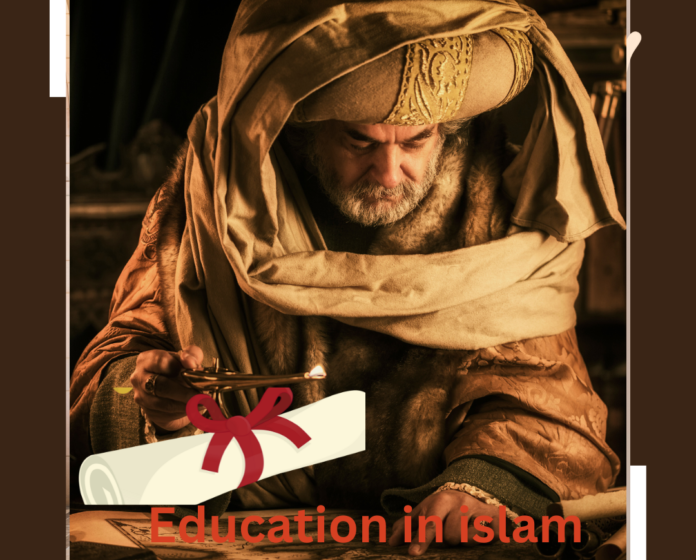
#Eduction In Islamic Perspective – IslamPeaceOfHeart
Education In Islamic Perspective
Introduction:
In the rich tapestry of Islamic tradition, education holds a pivotal place. The very first revelation to Prophet Muhammad (PBUH) underscores the importance of knowledge: “Read in the name of your Lord, who created: created man from a clot. Read! And your Lord is the most merciful, who has taught by the pen, taught man what he knew not” (Surah Al-Alaq, 1-5) 3. This divine emphasis on education sets the foundation for a lifelong journey of learning for every Muslim.
Knowledge: A Divine Obligation
Islam regards the pursuit of knowledge as a sacred duty. The Prophet Muhammad (PBUH) said, “Seeking knowledge is obligatory for every Muslim (men or women)” 3. This statement not only highlights the inclusivity of education in Islam but also its non-negotiable status. Knowledge equips individuals to navigate life’s complexities and fulfill their roles as responsible stewards of creation.
Wisdom from Hadith:
The Hadith literature is replete with references to the value of knowledge. Prophet Muhammad (PBUH) emphasized, “Seek knowledge though it may be as far as China” 3. This metaphorical expression underscores the lengths to which one should go in the pursuit of knowledge, breaking geographical and cultural barriers.
“The ink of the scholar is more holy than the blood of the martyr” 3 – This powerful saying elevates intellectual endeavors and underscores their lasting impact compared to even the highest forms of sacrifice.
The Role of Education in Shaping Character:
Education in Islam is not merely about academic learning but also about character building. The Quran asks, “Can those who have the knowledge and those who do not know be deemed equal?” (Surah Az-Zumar, 39:9) 3. This rhetorical question drives home the point that knowledge leads to enlightenment, better decision-making, and moral uprightness.
Prophet Muhammad (PBUH) further stressed, “The superiority of the learned man over the devout is like that of the moon, on the night when it is full, over the rest of the stars” 3. This analogy highlights the guiding role of educated individuals in society.
Pioneering Islamic Scholars:
Islamic history is adorned with scholars who have made significant contributions to various fields. Here are a few noteworthy examples:
Ibn Sina (Avicenna) (980–1037):
Ibn Sina, also known as Avicenna, was a Persian scholar who made substantial contributions to medicine, philosophy, astronomy, mathematics, and literature. His work, “The Canon of Medicine,” was a foundational medical textbook in both the Islamic world and Europe for many years 1.
Al-Farabi (872–950):
Al-Farabi was a renowned philosopher and scientist who contributed to political philosophy, metaphysics, ethics, and logic. He is often referred to as the “second teacher” after Aristotle due to his extensive works in philosophy 1.
Ibn Khaldun (1332–1406):
Ibn Khaldun was a historian and sociologist whose work laid the foundation for modern sociology and historiography. His seminal work, “Muqaddimah,” is regarded as one of the greatest works in the field of history 1.
Al-Biruni (973–1048):
Al-Biruni was a versatile scholar known for his contributions to astronomy, mathematics, and geography. His comparative studies of different cultures and his work on the movements of celestial bodies were groundbreaking 2.
Ibn al-Haytham (965–1040):
Ibn al-Haytham, also known as Alhazen, made significant contributions to optics, astronomy, and mathematics. His work “Kitab al-Manazir” (Book of Optics) laid the foundation for modern optics 2.
The Impact of Knowledge on Society:
The Prophet Muhammad (PBUH) proclaimed, “Whoever takes a path upon which to obtain knowledge, Allah makes the path to Paradise easy for him” 3. This promise not only motivates individual pursuit of knowledge but also hints at the broader societal benefits. Educated individuals contribute to a more just, compassionate, and progressive society.
Conclusion:
In conclusion, the Islamic perspective on education is holistic, encompassing both spiritual and worldly knowledge. It is a lifelong journey that begins from the cradle and continues to the grave, as echoed by the Prophet Muhammad (PBUH): “Acquire knowledge and impart it to the people” 3. For Muslims, education is a beacon of light that guides them through the complexities of life, helping them fulfill their roles as conscientious members of society.
As we strive to honor these timeless teachings, let us remember the prayer of the Prophet Muhammad (PBUH): “O Allah, I ask Thee for beneficial knowledge, acceptable action, and good provision” 3. In doing so, we not only enrich our lives but also contribute to the collective upliftment of our communities and the world at large.
By integrating these profound teachings into our lives, we not only fulfill a divine obligation but also pave the way for a brighter, more enlightened future.




